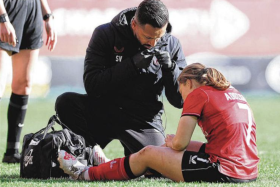Former EPL stars bullish over Chinese football
Fowler, Scholes and company impressed by Haiku's impressive 350 sq-km training base
COMMENT
Their glowing assessment of China's football came like a soothing balm in a period of near turmoil for the game in the world's most populous country.
Hopes soared and a dream vision appeared for Chinese football, following an endorsement from the country's president Xi Jinping and an influx of foreign stars into the Chinese League.
But after two recent defeats, China are hanging by a thread in the battle to qualify for the 2018 World Cup Finals, resulting in the resignation of coach Gao Hongbo and fortunes dipping to a new low.
However, at a recent gathering of former British star footballers at Mission Hills in Haiku, their talking-up of China's football future was like the proverbial "light at the end of the tunnel".
At the official opening of the new Mission Hills Haikou Football Training Base in China, which I witnessed recently, former England and Liverpool striker Robbie Fowler predicted that it will not be long before the country produces top-class players.
Fowler was joined on the tropical island of Hainan by former Liverpool teammates Luis Garcia and Gary McAllister along with Manchester United legends Paul Scholes, Dwight Yorke, Lee Sharpe and David May.
Having competed for the inaugural World Legends Cup alongside a selection of local players, the stars were unanimous in praising the new RMB 640 million ($130m) training facility while predicting a bright future for Chinese football.
"I think football will definitely grow here," said Fowler. "It's a country of a billion people, so there's bound to be some great players out there.
"With the concept here at Mission Hills, building all the pitches and getting football teams here, it might not be long before we see real top-class Chinese players."
Scholes was also upbeat about the future of the sport in the country.
The former England and Manchester United midfielder, now a pundit for a British newspaper, said: "China football will benefit from the European players coming to play here in the Chinese Super League.
"For young people growing up watching these special players, it will give them more motivation to improve and be dedicated to practise."
Sharpe said: "From what I have seen from the kids at the clinic, I can only foresee a bright future for Chinese football. The kids have enthusiasm, they are keen to learn and have shown basic skills."
The impressive new Mission Hills Haikou Football Training Base spans a total of 350 square kilometres.
With five full-size pitches and player accommodation already in place, the next phase will take the facility up to a total of 20 full-size pitches - six of them floodlit - plus a 1,000 square-metre gymnasium, a state-of-the-art medical centre, a canteen, three changing rooms and 20 indoor classrooms.
CHINESE DREAM
"Our aim is to help popularise football, a sport which is part of the Chinese dream," said Dr Ken Chu, chairman and CEO of the Mission Hills Group.
"We chose Hainan for our Football Training Base because of the year-round weather. It has been designed and built for players of all ages and abilities, from professional teams to amateur and youth organisations."
Chinese football received a fillip when Mr Xi, a big football fan, said in 2011 that he had three dreams for it: to qualify, to host and to win a World Cup.
As part of his football plans, the president has decreed that China will have 20,000 training centres and 70,000 pitches in place by 2020. The Haiku project is part of the scheme.
Spurred by that presidential decree, Chinese businessmen have rushed to back his vision, taking stakes in European clubs such as Manchester City and Atletico Madrid and buying up top players like Brazilian midfielder Ramires and Ivorian striker Gervinho for their own teams in China.
During the latest winter transfer window, Chinese Super League clubs splashed out more than US$280m ($390m) on foreign talent.
Meanwhile, a media mogul paid a record US$1.2b for the five-year rights to broadcast the Super League.
But some insiders feel that the foreign talent have actually stunted the growth of local footballers as the latter have been kept in the shadows.
More gloom for the world's 84th-Fifa-ranked nation came when coach Gao resigned immediately after the recent 2-0 defeat by Uzbekistan, following a 1-0 loss to Syria (leaving them with one point from four games) that prompted fans to take to the streets to demand his removal.
He was replaced by famed Italian coach Marcello Lippi (once coach of Chinese club Guangzhou Evergrande, who won the AFC Champions League in 2013 under his charge) who said that, despite their low position in the table, China's chances of qualifying for the 2018 World Cup are "not impossible but definitely worrying".
Generally, China have been a failure on the world stage, qualifying for the World Cup Finals just once in 2002, when the team were knocked out without scoring a single goal.
There is a also a consensus among their football pundits that China must go back to basics if it wants to resurrect its football.
The Haiku project is the start of a new revolution in Chinese football.
Get The New Paper on your phone with the free TNP app. Download from the Apple App Store or Google Play Store now


